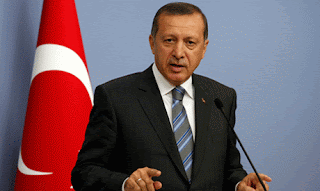Turkey’s Prime Minister Tayyip Erdoğan arrived in Cairo on Monday, accompanied by a delegation of 200 Turkish businessmen who seek closer trade ties with their counterparts in Egypt. The volume of trade between the two nations has reached $3 billion annually, which is a 40 per cent jump from the last three years.
Much of Erdoğan’s visit will focus on the establishment of a Strategic Cooperation Council between the two countries which will work to coordinate regional politicics.
Erdoğan’s visit to Egypt comes at a time when Turkey’s relationship with Israel and Iran is deteriorating. However, Turkey is expected to expand its role in the region by improving Turkish-African relations and also playing a bigger part in the Palestinian crisis, which will be solidified by Erdoğan’s meeting with Palestinian President Mahmoud Abbas later in the week.
The wall in front of the Israeli embassy in Cairo is being brought down. (AFP)
Both Egypt and Israel are saying that they are committed to the peace treaty and to continue the diplomatic relations on the same level as before, but it is obvious that the atmosphere has become cooler. Al Ahram Online reports that according to identical accounts offered by Egyptian officials and foreign diplomats in Cairo, Egypt had asked Israel before the developments of last Friday to keep the Israeli ambassador in Tel Aviv and to reduce the volume of its staff to the minimum, but Netanyahu insisted on sending the ambassador back only a few days before the latest protest.
"We are not expelling him, but we thought a long holiday for the Israeli ambassador in Egypt would be useful for all of us now; unfortunately, Israel thought otherwise and when anger erupted on Friday evening they had to solicit the intervention of the Americans who sent a plane to carry him and the rest of the staff out of Egypt," said one official.
Today, there is a tacit agreement between Egypt and Israel that the long holiday for the ambassador is in place and there are guarantees offered by Cairo to both Washington and Tel Aviv that stepped up security measures will be in place to prevent another attack on the embassy.
Meanwhile, Egypt is insisting that Israel should proceed faster with its investigation in the killing of Egyptian border guards – despite Israeli hesitation and complaints about the attack on its embassy.
"We are telling the Israelis that the authorities have to tell the public that it did not turn a blind eye to the killing of Egyptian soldiers," the same official added.

.jpg)
.jpg)




No comments:
Post a Comment